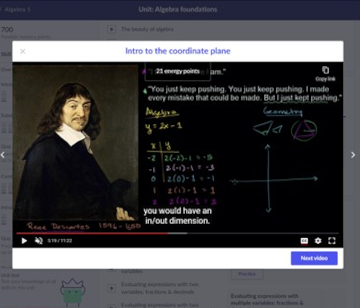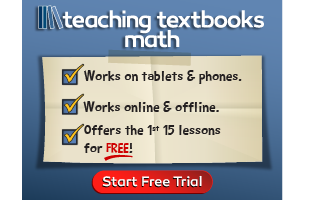Khan Academy began offering free course material many years ago, and they've gradually developed and expanded their material into excellent courses for kindergarten through high school, albeit with limited options below high school.
You can access courses without signing in, but creating an account allows the system to track progress. Khan now has a teacher dashboard where a parent or teacher can track student progress. You can select courses for Math, Science, Reading & Language Arts, and Arts and Humanities (history is in this category), plus courses from the categories Test Prep, Computing, Life Skills, and Economics. You can easily switch courses or add more.
It’s not always clear how much content there is for a course—whether it’s enough to qualify for a full course credit. Most high school math, science, and history courses appear to have content worth one credit. Math is covered with courses for algebra 1, algebra 2, geometry, trigonometry, and precalculus, plus AP® courses for calculus and statistics. There are also specialized math courses, such as a course titled High School Statistics. Under science, there are biology, chemistry, and physics courses, plus AP courses for those three topics and other courses, such AP College Environmental Science. None of these are lab courses. The category for Arts and Humanities for high school lists 11 courses that include both U.S. and world history, art history, and government, as well as AP courses for those subjects. There are no complete language-arts courses for any grade level, so this is the weakest area of coverage among the core subjects.
For grades two through eight, math courses are very substantial but lack review and the amount of practice typical of most courses. You can read my review of the K-8 math courses here. There is some math content for younger students via the Khan Academy Kids app.
The Reading & Language Arts courses for grades two through nine cover literature and vocabulary but no grammar or composition skills. One grammar course provides limited coverage of the subject and is probably best for ESL students or as a review for students in junior and senior high.
The courses are often plain in their design. The course presenters generally use a computerized whiteboard or blackboard to illustrate their voice-over presentations. A single lesson might have one or more brief videos or articles to read. Some courses include interactive screens, such as math lessons that tell students to move the dot to a particular number on a number line. Most lessons have a set of practice questions. Questions are most often presented in multiple-choice format, but math courses below high school use a variety of styles for questions. (Most sets have four to seven questions.) Students can have a second or third attempt to answer a question they miss, but their score still reflects the question as missed. Some math questions have solutions available. However, students can retake a quiz entirely to replace their previous score. Some AP courses prepare students to answer complex questions in writing. While they present lists of these questions, students will need to write out short-essay answers and have those evaluated by someone knowledgeable.
The courses have a certain number of mastery points (sometimes labeled as energy points) that can be earned as students answer the questions. They can also earn points from the periodic quizzes and unit tests. Students can skip around in the courses, and they can try to answer questions without watching videos. The latter is helpful when a course covers topics students have already mastered in previous courses. It appears that most of the courses offer a Course Challenge, a test to see if a student has already mastered the course’s content.
The courses are secular. Some courses are balanced to present various viewpoints. For instance, the U.S. Government and Civics course has a video on "Ideology and social policy" that presents a very even-handed contrast of views of liberals, conservatives, and libertarians on many hot-button issues. However, science courses teach about evolution without offering contrary viewpoints.
Summary
The courses are very easy to navigate and offer excellent content for free. One thing lacking is directions for the student as to how much lesson material they should complete in one day. It’s often more than one lesson. Homeschool Planet has created lesson plans to solve that problem, so you might want to consider using them.









